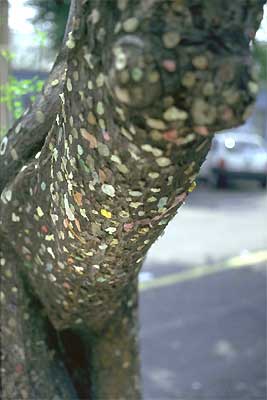
beautyme collections culture cuisine motor music search
 Liam
Gillick and Gabriel Kuri "por favor gracias de nada"
April 3 to 26, 2003 Mexico City,
Liam
Gillick and Gabriel Kuri "por favor gracias de nada"
April 3 to 26, 2003 Mexico City,
info@kurimanzutto.com
fig.: Gabriel Kuri, arbol con chicles, 1999, c-print 131 x 87 cm
Kuri continues to work with habitual systems, constructing oppositions that both operate together while systematically serving to cancel each other out. Thank you, no thank you (at present a nickname rather than a title for this new work), is a continuation of Kuri’s most recent practice, and consists of two separate groupings of collected plastic shopping bags, each attached to and inflated by a pivoting fan. Kuri has choreographed the movement between the two to allow them to both meet and miss each other at different points on their journey.
Kuri’s second work finds items of his clothing, dry-cleaned and pressed, preserved firstly by their protective plastic sleeves, and then in a refrigerator. The dichotomy created by Kuri’s clashing plastic bags is a device repeated in this work, but this time by acknowledging the cyclical processes of heating and chilling, which can be viewed as metaphors for recurring moments, actions and events which do not normally or necessarily overlap.
Both artists are interested in systems of operation and offer spaces for discussion which are not prescribed, and are often deliberately confused, pushing us to reassess the social space we inhabit. While the systems used in Gillick’s case exist substantially in parallel structures, like his texts, in Kuri’s case they are concealed within the object, and look little further than to their materiality for their meaning. While each artist has produced separate works for this exhibition, they will collaborate on a site-specific work which draws on both their practices and recognizes the siting of the exhibition in this unconventional and short-lived setting.
The artists’ first collaboration, involving just the two if them, was the project “Everyday Holiday” at Le Magasin, Grenoble (1996), which created a yearly calendar of events and special occasions based on following but altering local customs, Saint Day celebrations and commemorations. They also worked together with others on the exhibition ”Dedallic Convention” at MAK, Vienna (2001), a hypothetical convention which examined modes of improvisation. Kuri was also designated one of the supervisors for “The Trial of Pol Pot” (1998), a Phillippe Parreno and Liam Gillick project at Le Magasin, which assessed the tangible and the mythical within the enigmas behind this architect of genocide.
Liam Gillick, born in 1964, lives and works in London and New York. Studied at Hertfordshire College of Art (1983-4) and Goldsmith’s College, London (1984-7). He was short-listed for the Turner Prize in 2002, following his major institutional exhibition “The Wood Way” at Whitechapel Art Gallery, London and his presentation of “Annlee You Proposes” at Tate Britain. His work was featured in Dokumenta X, 1997. His vast exhibition record includes solo shows at Le Consortium Dijon, Kunstverein Munster, Arnolfini Bristol, Kunstverein Frankfurt and most recently, at Schipper Krome, Berlin, and Max Hetzler, Cologne, both in 2003.
Gabriel Kuri, born in 1970, lives and works in Mexico City. Studied at Escuela National de Artes Plasticas, Mexico (1988-92) and Goldsmiths’ College, London (1993-95). He has presented solo exhibitions in Mexico at Museo de las Artes de Guadalajara (1999), Sala 7 at Museo Rufino Tamayo (2001), and most recently at Sara Meltzer Gallery, New York (2002). He has also exhibited widely in international group shows including Sonsbeek 9 (2001), MAK, Vienna (2001), “Age of Influence” Museum of Contemporary Art, Chicago (2000), and in “New Sitings. Contemporary Projects 4” at LACMA (2000). He will present an outdoor project in the Venice Biennale in 2003.